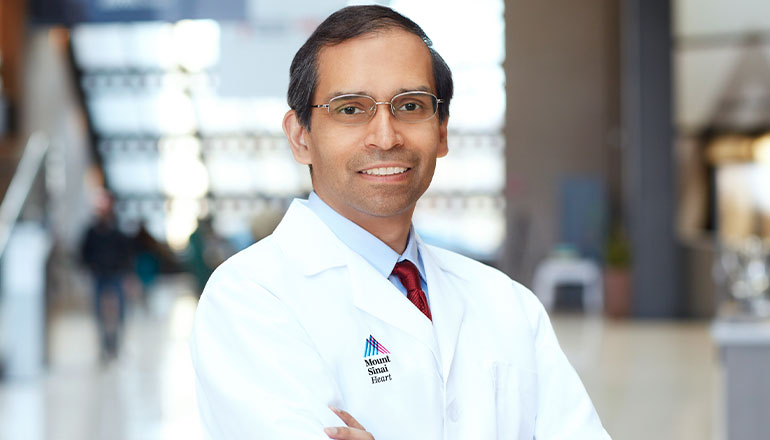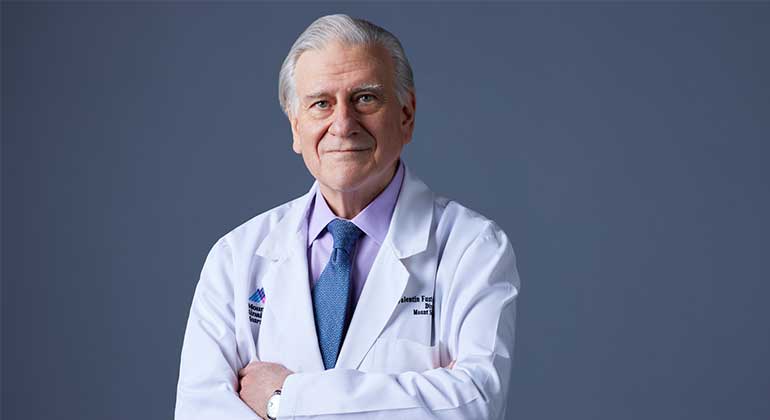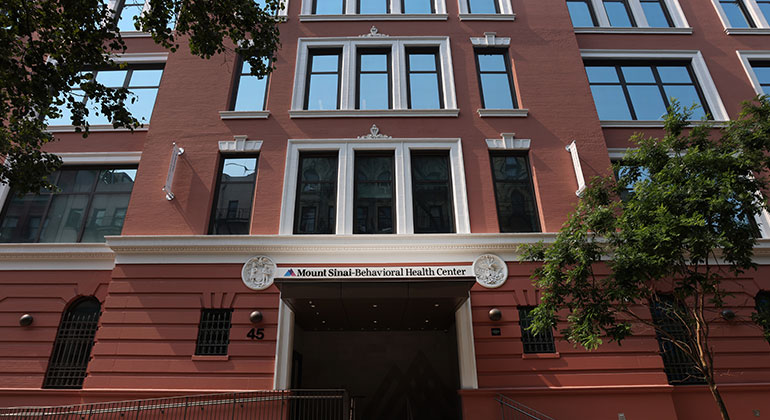Mount Sinai CEO Kenneth L. Davis, MD: Our Ability to Access Information in Real Time to Prevent Disease is Drawing Closer
Health care systems and genomics projects have generated massive patient data sets for years now, and the ability of the medical field to access and use this “Big Data” to improve health and cut costs is now on the horizon, predicts Kenneth L. Davis, MD, President and Chief Executive Officer of the Mount Sinai Health System in New York City. Physicians will have these new capabilities within two decades, preventing disease to dramatically “bend the cost curve” in medicine, Dr. Davis said.
He made his remarks as part of the Aspen Ideas Festival, held in Aspen, Colorado, from June 25 to July 4. Presented by the Aspen Institute and The Atlantic, the festival is a unique global exchange of ideas that gathers leading thinkers to discuss vital issues.
"The mapping of the human genome has given us the ability to see trends quickly, and combining that with the electronic medical record, we can see patterns in genes, or systems of genes, related to disease risk and treatment choices that we have never been able to see before," said Dr. Davis. "We are in a brave new world where new tests, apps and devices can predict illness before it happens,” and in real time, often before a patient leaves the doctor’s office.
"While we are currently able to identify high-risk patients using Mount Sinai supercomputers, I envision a future where hospital technicians in a central control room monitor and identify patients in danger of a medical crisis that we would prevent in real time using low-energy chips and the right mathematics," said Dr. Davis.
During the festival, the Supreme Court upheld the Affordable Care Act’s subsidies for individual health insurance in states with a federal exchange. On that topic, Dr. Davis told audiences: "The ruling stabilizes insurance markets and ensures health coverage for millions of Americans. Since the enactment of health care reform, our health system has worked to adapt to the changing health care landscape, shifting away from the fee-for-service model, moving toward population health management, and streamlining services to reduce readmissions. The decision enables us to move forward in providing comprehensive, accessible care to our communities."
During a panel on "Providing a Social Safety Net," Dr. Davis pointed out that the United States, as compared to other countries, spends a disproportionate amount on its health care system, and much less on its social safety net. "What we see in health care, especially in the communities that Mount Sinai serves, is how frayed the social safety net is. Through government-funded, preventable admission programs, we have trained case managers to help manage patients at risk in the communities we serve. Our interventions have been so effective that the number of emergency visits for these high-risk patients has been dramatically reduced. But we need to reinvest in these programs to sustain them. "
Dr. Davis also said that reducing obesity and increasing physical activity is critical to improving health and reducing the cost of chronic disease in communities. "In the neighborhood we serve of East Harlem, 25 percent of kids in Head Start are obese and 40 percent are overweight. We are nearing a health catastrophe and we need to make sure we are creating enough spaces where children can play," said Dr. Davis during a panel on "Physical Literacy.” "Perhaps we can make federal education dollars contingent on physical education programs in schools."
During a conversation on the 21st Century Cures Act, which calls for the appropriation of National Institutes of Health (NIH) funding for biomedical research, Dr. Davis said he favored longer market exclusivity (patent protection) to incentivize pharmaceutical companies to invest in compounds that treat chronic diseases like Alzheimer's disease.
In a panel on "The Power and Importance of Failure in Business," Dr. Davis said that Mount Sinai is now a robust health system with a renowned medical school and seven hospital campuses. However, in early 2000, the Mount Sinai Medical Center – at the time comprising two hospitals and the medical school – was reeling after a failed merger with NYU Medical Center and the inability to adapt to the Balanced Budget Act. In 2003, Dr. Davis took on the role of Dean of the Medical School after serving as Chairman of Mount Sinai's Department of Psychiatry for 16 years. Six weeks later, he was asked to take over as CEO. "I witnessed a series of failures in management. Our financials were in a tailspin. However, I was able to put in a leadership team that was focused on data and solving problems. We also shared the same values of collaboration and transparency. We were able to turn around our financial situation."
Other Mount Sinai panelists included Brian Koll, MD, Executive Director for Infection Prevention and Control for the Mount Sinai Health System and Professor of Medicine for the Icahn School of Medicine at Mount Sinai, and Eric Nestler, MD, PhD, Nash Family Professor of Neuroscience and Director, Friedman Brain Institute, Icahn School of Medicine.
Addressing lessons learned during the recent U.S. Ebola crisis, Dr. Koll said that not enough respect was given to the virus when it first arrived in the United States. “We didn’t really understand the transmission of the disease, and were not ready for the volume of fluids and issues regarding fluid replacements in patients sick with Ebola. We learned that staffing needed to be adjusted and many more nurses than usual were needed to treat a single patient with Ebola, and had to make sure the health workers wearing personal protective gear felt comfortable and safe in the gear chosen."
Dr. Nestler spoke on a panel titled "What the Science Tells Us About Beating Addiction." "We know that addiction is a complex disorder with strong psychological and social factors, but at its core is a biological process. Over the past two decades, we have learned a great deal about that process and how drugs of abuse change the brain to cause addiction. In fact, we have been able to identify the initial targets in the brain that drugs of abuse bind to, how those drugs affect the nerve cells that express those targets and how those nerve cells change over time during the course of repeated exposure to cause behavioral abnormalities that we call drug addition," said Dr. Nestler.
For a summary of Mount Sinai’s participation at Aspen, please go to this link.
About the Mount Sinai Health System
Mount Sinai Health System is one of the largest academic medical systems in the New York metro area, employing 48,000 people across its hospitals and more than 400 outpatient practices, as well as more than 600 research and clinical labs, a school of nursing, and a leading school of medicine and graduate education. Mount Sinai advances health for all people, everywhere, by taking on the most complex health care challenges of our time—discovering and applying new scientific learning and knowledge; developing safer, more effective treatments; educating the next generation of medical leaders and innovators; and supporting local communities by delivering high-quality care to all who need it.
Through the integration of its hospitals, labs, and schools, Mount Sinai offers comprehensive health care solutions from birth through geriatrics, leveraging innovative approaches such as artificial intelligence and informatics while keeping patients’ medical and emotional needs at the center of all treatment. The Health System includes approximately 9,000 primary and specialty care physicians and 11 free-standing joint-venture centers throughout the five boroughs of New York City, Westchester, Long Island, and Florida. Hospitals within the System are consistently ranked by Newsweek’s® “The World’s Best Smart Hospitals, Best in State Hospitals, World Best Hospitals and Best Specialty Hospitals” and by U.S. News & World Report's® “Best Hospitals” and “Best Children’s Hospitals.” The Mount Sinai Hospital is on the U.S. News & World Report® “Best Hospitals” Honor Roll for 2024-2025.
For more information, visit https://www.mountsinai.org or find Mount Sinai on Facebook, Twitter and YouTube.

Mount Sinai Reports Progress on Its Road Map for Action to Address Racism
Jun 07, 2023 View All Press Releases
New York’s Mount Sinai Health System Opens Concierge Medicine Practice in West Palm Beach
May 15, 2023 View All Press Releases
Deepak L. Bhatt, MD, MPH, Named Director of Mount Sinai Heart
Oct 31, 2022 View All Press Releases
Valentin Fuster, MD, PhD, Named President of Mount Sinai Heart
Oct 18, 2022 View All Press Releases
